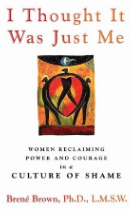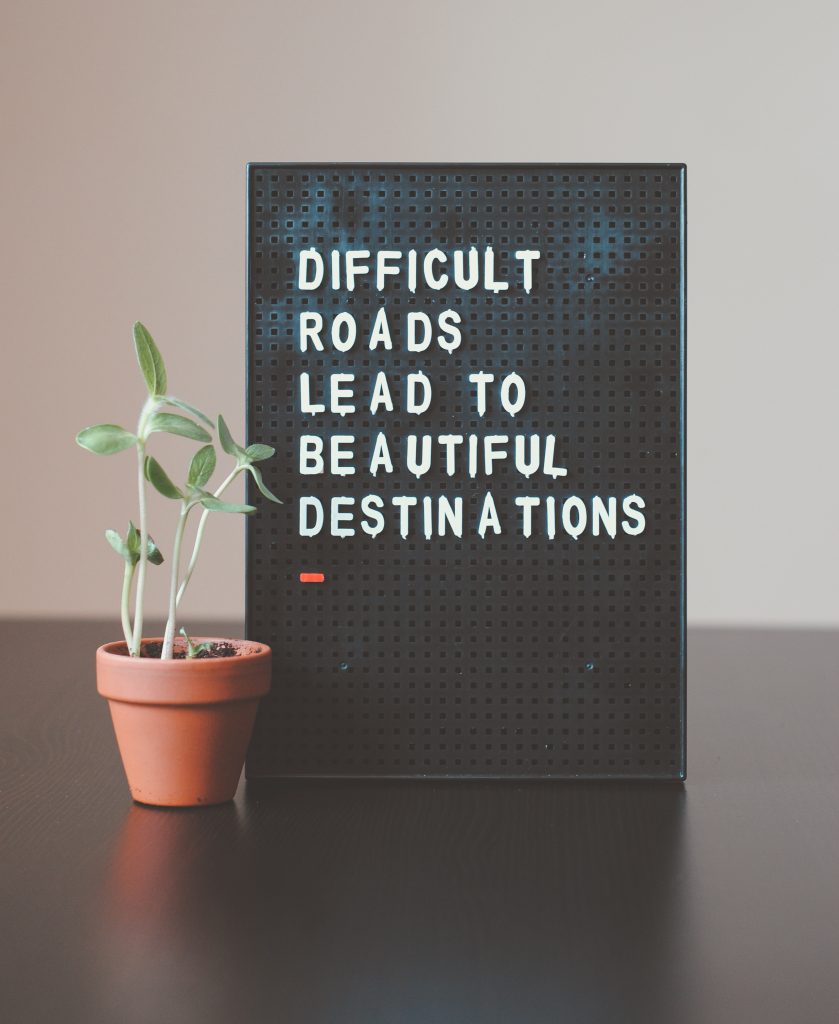
Courage and empathy
Brene Brown in her book – I Thought It Was Just Me: Women Reclaiming Power and Courage in a Culture of Shame, talks about the effects of shame on us.

Google Books, describes Brown’s book this way – “An affirming, revealing examination of the painful effects of shame—with new, powerful strategies that promise to transform a woman’s ability to love, parent, work, and build relationships.
Shame manifests itself in many ways. Addiction, perfectionism, fear and blame are just a few of the outward signs that Dr. Brené Brown discovered in her 6-year study of shame’s effects on women. While shame is generally described as an emotion sequestered in the shadows of our psyches, I Thought It Was Just Me shows how it is present in the most mundane and visible aspects of our lives—from our mental and physical health and body image to our relationships with our partners, our kids, our friends, our money, and our work.” 1
The complexities and nuances of shame are multi-faceted and its effects far-reaching for all of our lives: in our families, workplaces and communities. In every single relationship we experience shame, and it can often affect us deeply.

I am listening to Brene’s book on Audio, and I find my throat tightening from time to time. The subject is tender, and she gives us real examples of women affected by shame based on her extensive research. So, it has a way of tugging at your heart; you find yourself caught up in the example’s emotion or relating to the stories she tells.
Today, as I was driving in my car and listening to this book, I found my imagination captured. Brene tells us how the definition of courage has changed over the years.
Brene says it best herself: “Courage is a heart word. The root of the word courage is cor – the Latin word for heart. In one of its earliest forms, the word courage meant “To speak one’s mind by telling all one’s heart.” Over time, this definition has changed, and today, we typically associate courage with heroic and brave deeds. But in my opinion, this definition fails to recognize the inner strength and level of commitment required for us to actually speak honestly and openly about who we are and about our experiences — good and bad. Speaking from our hearts is what I think of as “ordinary courage.” 2

She speaks of courage also as the ability to have a “voice.” To speak out. Not shrink back; say what you mean, mean what you say. This struck me, culture socializes women to be peacemakers or to hold back. Pussy-foot around. Don’t be direct. And this is so difficult for us. We avoid, redirect. We put on a good face.
Yet, Brene says, courage is to “To speak one’s mind by telling all one’s heart.” Ah, the gift of vulnerability.
“Vulnerability is not weakness. I define vulnerability as an emotional risk, exposure, uncertainty. It fuels our daily lives.” 3 And, “Vulnerability is the birthplace of innovation, creativity, and change.” 4
But, it is frightening being vulnerable; there is so much inherent risk. What if they don’t like me? What if they judge me and then reject me? The sting of rejection bites like a poisonous jellyfish. And the sting, it may wear off, but it eats into the essence of who we feel we are. And it pops up at the most inconvenient times. Its torture is both subtle and in your face. It whispers destructive lies, “I am not good enough,” “I don‘t belong,” “I am not important or loved or (fill in the blank).” And the wounds sink deep into our subconscious, colouring our outlook on life and our relationships with others.
Still, healing can be found in vulnerability. In it we learn that we do not suffer alone. In it we find and build deep and meaningful relationships. When we are vulnerable and open to facing ourselves as we are, good traits, faults and failings as well, we learn a valuable skill. We learn that, “The ability to hold something we’ve done or failed to do up against who we want to be is incredibly adaptive. It’s uncomfortable, but it’s adaptive.” 5
This is how we grow.

In all of this – using courage, speaking from our hearts, being vulnerable – we will utterly fail if we do not practice empathy. We need to extend empathy both to ourselves, and to others around us. If we are harsh and judgmental of ourselves, chances are we will dish out those self same attitudes to others.
“In I Thought it Was Just Me (But It Isn’t) (2008), Brown references nursing scholar Theresa Wiseman’s four attributes of empathy:
- To be able to see the world as others see it—This requires putting your own “stuff” aside to see the situation through your loved one’s eyes.
- To be nonjudgmental—Judgement of another person’s situation discounts the experience and is an attempt to protect ourselves from the pain of the situation.
- To understand another person’s feelings—We have to be in touch with our own feelings in order to understand someone else’s. Again, this requires putting your own “stuff” aside to focus on your loved one.
- To communicate your understanding of that person’s feelings—Rather than saying, “At least you…” or “It could be worse…” try, “I’ve been there, and that really hurts,” or (to quote an example from Brown) “It sounds like you are in a hard place now. Tell me more about it.” 6
Empathy draws near, hears, validates. It creates space for the person in pain, sits with them. Sympathy in contrast, says, “that‘s too bad for you, and get over it.” When we offer empathy we are offering others the opportunity to be courageous: “To speak one’s mind by telling all one’s heart.” With empathy, we say, “You belong, you are important, you are enough, someone loves you.” When you show empathy you open the door to vulnerability and thus heart-felt connection. And then we begin to heal, together.
We start with courage. Then we develop empathy and compassion, essential tools for the human race.
And Brown points out – we cannot operate out of empathy and compassion from a place of superiority.
“Compassion is not a relationship between the healer and the wounded. It’s a relationship between equals. Only when we know our own darkness, can we be present with the darkness of others? Compassion becomes real when we recognize our shared humanity.” 7
I want to live like this. With courage, “speak my mind by telling my heart,” and with empathy, offering kindness and compassion to those around me.

What about you? What are your thoughts on courage and empathy?
Watch this video on Empathy.
1 – https://www.goodreads.com/quotes/737201-courage-is-a-heart-word-the-root-of-the-word
2 – https://www.goodreads.com/quotes/737201-courage-is-a-heart-word-the-root-of-the-word
3 – https://bookriot.com/2018/04/16/brene-brown-quotes/
4 – https://bookriot.com/2018/04/16/brene-brown-quotes/
5 – https://bookriot.com/2018/04/16/brene-brown-quotes/
6 – https://www.psychologytoday.com/ca/blog/partnering-in-mental-health/201408/bren-brown-empathy-vs-sympathy-0
7 – https://bookriot.com/2018/04/16/brene-brown-quotes/







-
-
4 years
Tagged Boundaries, Exits, Forgiveness, Friendships, Relationships